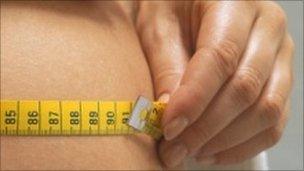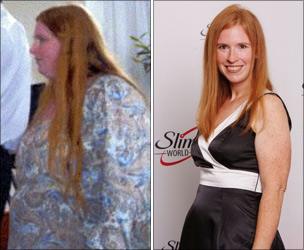One in 20 pregnant women is dangerously obese - study
- Published

In the UK more than 38,000 pregnant women are dangerously obese
Around 5% of all pregnant women in the UK - more than 38,000 - are severely obese, putting them and their babies at risk, according to a new study.
A stillbirth is twice as likely if the mother is severely obese.
Very overweight mothers are also at greater risk of blood clots, high blood pressure and bleeding after birth.
And the researchers for the Centre for Maternal and Child Enquiries (CMACE) found many maternity units were not set up to care for very overweight women.
For the first time, researchers for the Centre for Maternal and Child Enquiries (CMACE) looked at pregnant women's Body Mass Index (BMI), a measure of obesity, collecting information from every maternity unit in the country.
Complications and risk
Dr Kate Fitzsimons, lead researcher for the project, says it is important to know how many obese pregnant women there are.
"It matters because the risk of complications and adverse outcomes increases with increasing BMI.
"We need to know how best to manage these complications and reduce the risk during pregnancy because the problems don't just affect the mother; they also affect the baby."
The health risks to very overweight pregnant women are already fairly well known, but this study found that many are not getting the kind of care they need.
While there is an increased risk of life threatening blood clots, only about half of obese pregnant women were offered treatment to prevent this at their first antenatal appointment.
Lack of equipment
Maternity units also sometimes struggle to cater for very overweight mothers, reporting a lack of extra-wide wheelchairs, examination couches, trolleys and beds.
Seeing some of the problems first hand is Tim Draycott, a consultant obstetrician at St. Michael's Hospital in Bristol.
"Up until very recently our Caesarean operating table only had a weight limit of 150 kilos (just over 23 and a half stone).

Rebecca Fyfe weighed more than 19st 6lbs but has since lost 10 stone
"We probably have 20 women a year over 150 kilos, so we now have a new table that goes up to 250 kilos."
A close call
Rebecca Fyfe is a mum of seven children who went through pregnancies very obese, weighing 19st 6.5lbs at her heaviest.
"I had a lot of complications, including high blood pressure.
"During the delivery of one of my children I almost died, my blood pressure spiked up so high."
But when she had her seventh child Rebecca started eating much healthier food, losing weight in the process.
This time she suffered no high blood pressure or hip pain and had much more energy.
"I was less worried when I was healthier during pregnancy.
"I didn't end up in hospital until I was having the baby, I didn't have swollen ankles, I didn't have pain in my feet, I could walk around; it was a lot easier."
The report says women need better advice, care and support before they get pregnant, as well as better screening for existing medical conditions and possible complications.
The general secretary of the Royal College of Midwives, Cathy Warwick, said the findings backed up their own research.
"Women have told us that they are not getting the level of care that they should from maternity services.
"There is no doubt that being obese and pregnant can leave women open to more problems in pregnancy than non-obese women.
"However, with high quality care these problems can be identified and treated and women can have a very positive experience of pregnancy and birth."
- Published28 July 2010